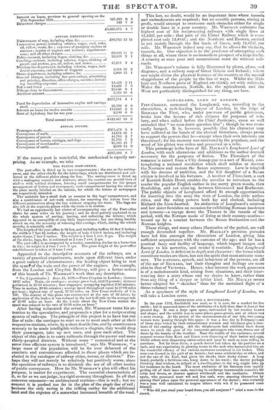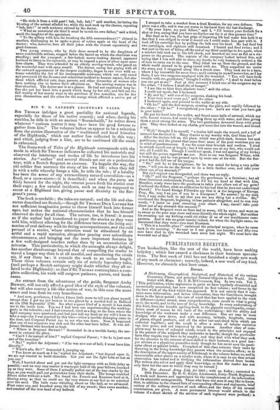LONGBEARD, LORD OF LONDON.
FITZ-OSBERT, surnamed the Lougbeard, was, according to the chroniclers, a mob-leading lawyer of London, in the reign of RICHARD the First, who, under pretence of public grievances, broke into the houses of rich citizens for purposes of rob- bery, and when called before the Chief Justiciary, came so well attended that " no man durst question him" ; though he was even- tually hanged. It is, however, possible that his character may have suffered at the hands of the-clerical historians, always prone to support the powers that be—except when their own interests are threatened ; for his memory was venerated by the populace, and the wood of his gibbet was stolen and preserved as a relic. This personage is the hero of Mr. MAcHAr's Longbeard Lord of London, with such alterations and additions as the author deemed necessary for the purposes of fiction. The Fitzosbert of the romance is raised from a City demagogue to a sort of Rienzi, con- templating a national revolution which shall subdue or destroy the Normans and restore the Saxon supremacy. Love is mingled with -his dreams of ambition, and the fair daughter of a Saxon citizen is involved in his fortunes. A brother of Fitzosbert, a sort of Kentish Robin Hood, enables the novelist to introduce to the reader the popular English outlaw in the merry green woods, then flourishing, and yet exist:ng, between Gravesend and Rochester. The public objects of Longbeard afford fit enough opportunities for inserting into the story the riots of London, the civic autho- rities, and the ruling powers both lay and clerical, including Richard the Lion-hearted. An abduction of Longbeard's mistress and her sister furnishes an occasion for exhibiting Norman insolence and tyranny—a voyage down the Thames in the vessels of the period, with the Norman mode of living at their country-castles- wound up by a combat between the Saxon freebooters and the Norman knights.
These things, and many others illustrative of the period, are well enough dovetailed together. Mr. MACKAY'S previous pursuits have led him amongst the chroniclers of London, giving him sufficient acquaintance with the customs of the age; and he has.a poetical fancy and facility of language, which impart images and fluency to his narrative, and render it readable. But Longbeard Lord of London, is deficient in depth and character : the forms which constitute modes are there, but not the spirit that must animate man- ners. The costumes, speech, and behaviour of the persons, are all of the age of RICHARD, but their thoughts and feelings are more akin to that of VICTORIA. Hence, what interest the work possesses is of a melodramatic kind, arising from situations, and their inter- weaving into a story whose end we desire to know, rather than from any thing of a deeper or loftier kind. Mr. MacKay seems better adapted for "sketches" than for the -sustained flight of a three-volumed work.
As a specimen of the style of Longbeard Lord of London, -we will take a London scene.
SMITHFIELD AND A MOUNTEBANK.
In the year 1192, Smithfield was used, as it is now, for a market for live cattle ; but it possessed more of the attributes of a field then than it does at the present day. It was a large open space, surrounded by low wooden houses and shops ; and the middle was in some places grass-grown, and at others was a mere swamp. At the period of the commencement of our tale, two young women were passing through this space: it was a fine day in February—one of those days which by their extraordinary warmth and loveliness give a fore- taste of the coming spring. All the shopkeepers had exhibited their finest wares to catch the gaze of the numerous passengers who were drawn out-of doors by the beauty of the weather. Near the middle of the enclosure, seVeral peasant-women from Kent and Essex were disposing of their butter and eggs, whilst others were dispensing oaten-cakes and meat to such as were willing to purchase. Not far from them, a quack-doctor had taken up his position on a cask, and was expatiating in glowing terms to the mob who surrounded him on the wonderful efficacy of the various nostrums contained in his basket. This man was dressed in the garb of an Asiatic ; but some artificial dye or other, and not the sun of the East, had given his cheeks their dusky colour. A long beard, probably a fictitious one, hung down to his waist ; the doctor perhaps thinking that wisdom, in default of a dwellingplace in the wig, might take up her residence in the beard. The most credulous of his listeners were rapidly getting rid of their loose cash, receiving in exchange innumerable remedies for colds and fevers, or charms against witchcraft and the toothache. Others again, who possessed more wit and less cash, were amusing themselves by passing their jokes upon the personal appearance of the doctor; who certainly was a man well calculated to inspire others with wit if he possessed none himself.
"Who did you steal your beard from, you old conjuror?" cried a man in the crowd.
"Be stole it from a wild goat ! bah, bah, bah!" said another, imitating the bleating of the animal alluded to; while the mob took up the chorus, repeating "bib, bah!" at each sentence uttered by the doctor.
"What an unnatural old thief it must be to rob its own father," said a third, -amid the laughter of the spectators.
"To the pillory with him for breaking the fifth commandment!" chimed in another, discharging as he spoke a piece of rotten apple at the head of the doctor; who, however, bore all their jokes with the utmost equanimity and good-humour.
Two young women, who by their dress seemed to be the daughters of some comfortable artisan, stopped before the barrel on which the charlatan was standing; and the youngest, a fair-haired, merry-looking damsel, appeared inclined to listen to his rigmarole, or may be expend a piece of silver upon some love-charm. They were attended by an elderly serving-wench, who gazed on the wonderful man with open mouth. The doctor, seeing her gaping with all the outward appearances of the deepest credulity, began to run over with ex- treme volubility the list of his incomparable nostrums, which not only cured and prevented all the di,eases and calamities incident to human nature, but also those which afflicted cats, dogs, parrots, and other favourites of women who have nothing else to bestow their affections on. The serving-woman was in that situation. The doctor saw it at a glance. He had not expatiated long be- fore she put her hand into a pouch which hung by her side, and laid out the full moiety of her scanty store in the purchase of two remedies, one for her own rheumatism and the other for the mange which afflicted a canine pet of hers.



























 Previous page
Previous page